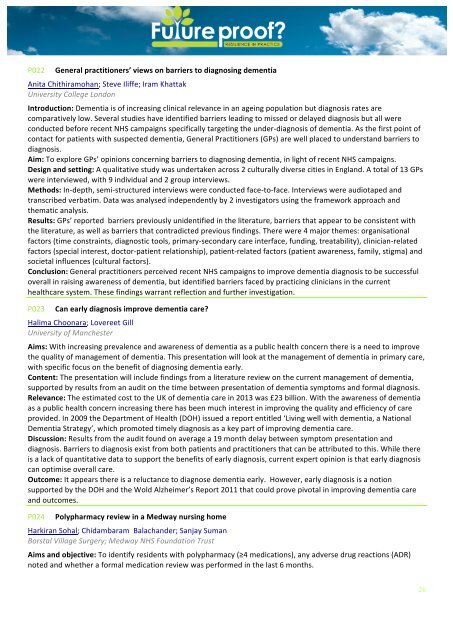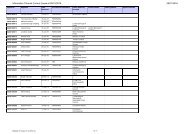RCGP-2014-poster-abstracts
RCGP-2014-poster-abstracts
RCGP-2014-poster-abstracts
You also want an ePaper? Increase the reach of your titles
YUMPU automatically turns print PDFs into web optimized ePapers that Google loves.
P022 <br />
General practitioners’ views on barriers to diagnosing dementia <br />
Anita Chithiramohan; Steve Iliffe; Iram Khattak <br />
University College London <br />
Introduction: Dementia is of increasing clinical relevance in an ageing population but diagnosis rates are <br />
comparatively low. Several studies have identified barriers leading to missed or delayed diagnosis but all were <br />
conducted before recent NHS campaigns specifically targeting the under-‐diagnosis of dementia. As the first point of <br />
contact for patients with suspected dementia, General Practitioners (GPs) are well placed to understand barriers to <br />
diagnosis. <br />
Aim: To explore GPs’ opinions concerning barriers to diagnosing dementia, in light of recent NHS campaigns. <br />
Design and setting: A qualitative study was undertaken across 2 culturally diverse cities in England. A total of 13 GPs <br />
were interviewed, with 9 individual and 2 group interviews. <br />
Methods: In-‐depth, semi-‐structured interviews were conducted face-‐to-‐face. Interviews were audiotaped and <br />
transcribed verbatim. Data was analysed independently by 2 investigators using the framework approach and <br />
thematic analysis. <br />
Results: GPs’ reported barriers previously unidentified in the literature, barriers that appear to be consistent with <br />
the literature, as well as barriers that contradicted previous findings. There were 4 major themes: organisational <br />
factors (time constraints, diagnostic tools, primary-‐secondary care interface, funding, treatability), clinician-‐related <br />
factors (special interest, doctor-‐patient relationship), patient-‐related factors (patient awareness, family, stigma) and <br />
societal influences (cultural factors). <br />
Conclusion: General practitioners perceived recent NHS campaigns to improve dementia diagnosis to be successful <br />
overall in raising awareness of dementia, but identified barriers faced by practicing clinicians in the current <br />
healthcare system. These findings warrant reflection and further investigation. <br />
P023 <br />
Can early diagnosis improve dementia care <br />
Halima Choonara; Lovereet Gill <br />
University of Manchester <br />
Aims: With increasing prevalence and awareness of dementia as a public health concern there is a need to improve <br />
the quality of management of dementia. This presentation will look at the management of dementia in primary care, <br />
with specific focus on the benefit of diagnosing dementia early. <br />
Content: The presentation will include findings from a literature review on the current management of dementia, <br />
supported by results from an audit on the time between presentation of dementia symptoms and formal diagnosis. <br />
Relevance: The estimated cost to the UK of dementia care in 2013 was £23 billion. With the awareness of dementia <br />
as a public health concern increasing there has been much interest in improving the quality and efficiency of care <br />
provided. In 2009 the Department of Health (DOH) issued a report entitled ‘Living well with dementia, a National <br />
Dementia Strategy’, which promoted timely diagnosis as a key part of improving dementia care. <br />
Discussion: Results from the audit found on average a 19 month delay between symptom presentation and <br />
diagnosis. Barriers to diagnosis exist from both patients and practitioners that can be attributed to this. While there <br />
is a lack of quantitative data to support the benefits of early diagnosis, current expert opinion is that early diagnosis <br />
can optimise overall care. <br />
Outcome: It appears there is a reluctance to diagnose dementia early. However, early diagnosis is a notion <br />
supported by the DOH and the Wold Alzheimer’s Report 2011 that could prove pivotal in improving dementia care <br />
and outcomes. <br />
P024 <br />
Polypharmacy review in a Medway nursing home <br />
Harkiran Sohal; Chidambaram Balachander; Sanjay Suman <br />
Borstal Village Surgery; Medway NHS Foundation Trust <br />
Aims and objective: To identify residents with polypharmacy (≥4 medications), any adverse drug reactions (ADR) <br />
noted and whether a formal medication review was performed in the last 6 months. <br />
26



